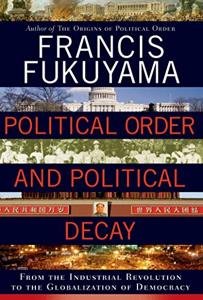
Want to learn the ideas in Political Order and Political Decay better than ever? Read the world’s #1 book summary of Political Order and Political Decay by Francis Fukuyama here.
Read a brief 1-Page Summary or watch video summaries curated by our expert team. Note: this book guide is not affiliated with or endorsed by the publisher or author, and we always encourage you to purchase and read the full book.
Video Summaries of Political Order and Political Decay
We’ve scoured the Internet for the very best videos on Political Order and Political Decay, from high-quality videos summaries to interviews or commentary by Francis Fukuyama.
1-Page Summary of Political Order and Political Decay
Overview
As the 1980s ended and the 90s began, authoritarian communist regimes in Europe were collapsing. The Cold War was over, and it looked as though democratic Western countries had won. At that time, Francis Fukuyama declared this moment to be “the end of history,” which became famous.
But was the fall of communism really the end of history? And has democracy truly flourished since then? Many democracies around the world are struggling, and we’ll take a closer look at how American democracy is in decline. We will focus on institutions that can help give democracy its best chance for survival. In an era where populism is rising, it’s crucial to understand these institutions if you want to secure the future of democracy.
In this article, you will learn about the 12,000 registered lobbying firms in Washington DC and how they are affecting democracy. You’ll also find out why a declining middle class is an issue that needs to be addressed and how the US Forest Service is a clear example of American institutions in decay.
Big Idea #1: Democracy is the cornerstone of American politics.
The word democracy is often used, but it’s not always clear what people mean when they use it. It can be a philosophical debate or something that we take for granted in our culture and politics. In order to understand the meaning of this term more clearly, let’s put the concept into context first.
Democracy is a form of government where the people have a say in how they’re governed. In 1789, the United States Constitution gave citizens an unprecedented level of equality and fair representation within their own government.
The United States’ political system was corrupt for much of its early history. The country’s values were ignored, and the rich controlled the government during that time.
The American federal government underwent a transformation in the 1800s. It went from being controlled by business conglomerates to an independent, effective and value-driven political actor. This happened as a result of politics during the Progressive movement, led by people like Theodore Roosevelt who broke up big businesses. The New Deal also contributed to this transformation, providing citizens with healthcare and pensions. Industrialization changed social structures and was responsible for empowering new groups of people that would shake up old institutions such as slavery.
By 1989, democracy was on top. Francis Fukuyama argued in his book The End of History that the fall of communism marked the end of history and democracy’s triumph. He predicted that its global expansion was inevitable.
The number of democracies around the world has been increasing. There were 35 in 1970, but there are 120 today. This is a 60 percent increase from forty years ago. However, even with this trend toward democracy, it isn’t without its challenges and obstacles along the way.
Big Idea #2: A large and strong middle class is essential for a stable democracy.
Aristotle, a philosopher, argued that the middle class is necessary for healthy states and democracies. A political scientist defines the middle class as one’s position in society based on education and social standing. If someone who is poor gets a better paying job but has little education, they would move into the middle class. However, if he loses his job then falls back into poverty or becomes unemployed again, he will be unable to protest because of his difficult situation. By contrast, someone with an advanced degree who can’t find work could also fall out of the middle class due to their unemployment; however they are more likely to protest this situation than those without an advanced degree.





